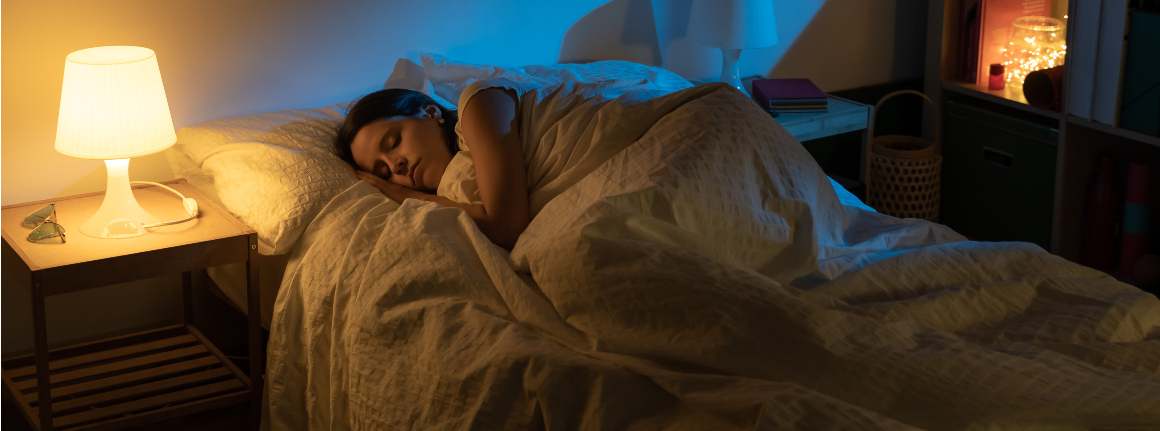How to Get More Deep Sleep?
Published:
Many individuals find it hard to get the good rest they need for their overall health and wellness. In this blog post, we will explore various strategies on how to get more deep sleep, so you can wake up feeling refreshed and rejuvenated.
Contents:
- The Importance of Deep Sleep
- Creating an Ideal Sleep Environment
- Limit Screen Time Before Bedtime
- Exercise's Impact on Deep Sleep Cycles
- Timing Your Sleep Intervals Properly
- Incorporating Pink Noise into Your Sleep Routine
- Deep Sleep Supplements and Their Effects
- FAQs in Relation to How to Get More Deep Sleep
- Conclusion
We'll begin by discussing the significance of hormone regulation during deep sleep and its impact on strengthening the immune system. Next, we'll delve into creating a sleep-friendly environment by addressing optimal room temperature and the effects of blue light on melatonin production.
Moving forward, we'll examine exercise's impact on deep sleep cycles, including brainwave patterns related to relaxation and consistent sleeping schedules. Additionally, we'll cover timing your sleep for maximum restfulness with a focus on alarm timing in achieving adequate amounts of both deep and REM sleep.
Lastly, we will discuss the power of pink noise in affecting memory function during sleep as well as natural remedies such as melatonin supplements and valerian root that may help promote relaxation - all contributing factors in how to get more deep sleep.

The Importance of Deep Sleep
Deep sleep, the third stage of NREM sleep, is essential for our health as it helps regulate hormones and strengthen immunity, while also aiding in tissue growth and memory function. It regulates hormones, strengthens the immune system, promotes muscle and tissue growth, aids cellular repair processes, improves memory function, and clears waste products from cerebrospinal fluid. Insufficient deep sleep can lead to daytime fatigue and increase the risk of developing chronic conditions like diabetes.
Hormone Regulation During Deep Sleep
During this stage of NREM slumber, your body releases essential hormones such as human growth hormone (HGH) which helps in repairing tissues and building muscles. Additionally, it balances insulin levels to maintain proper blood sugar control throughout the day. Inadequate amounts of deep sleep can disrupt these hormonal functions leading to an increased risk for obesity and type 2 diabetes (source). Therefore, it's vital to prioritize getting enough quality rest each night.
Strengthening the Immune System Through Restorative Slumber
A strong immune system relies on adequate amounts of deep sleep for optimal functioning. During this phase of NREM slumber, immune cells are replenished, allowing your body to better fight off infections and inflammation. A lack thereof may weaken your immunity over time, making you more susceptible to illnesses.
Maintaining Good Overall "Sleep Hygiene"
- Create an environment conducive to restful slumber
- Keep your bedroom dark and quiet with optimal room temperature settings
- Maintain a consistent sleep schedule, even on weekends
- Avoid caffeine and alcohol close to bedtime
- Establish a relaxing pre-bedtime routine such as reading or taking a warm bath.
To get more deep sleep naturally at night, maintain good overall "sleep hygiene" by creating an environment conducive to restful slumber. Keep your bedroom dark and quiet with optimal room temperature settings for better quality relaxation throughout each stage in the NREM cycle. Additionally, make sure you have comfortable bedding, including pillows that support proper spinal alignment while sleeping.
Tips for Improving Hormone Regulation During Deep Sleep:
- Eat a balanced diet rich in nutrients that promote hormonal balance (e.g., magnesium, zinc).
- Avoid exposure to artificial light before bed which can interfere with melatonin production.
- Incorporate stress-reducing activities into your daily routine (e.g., yoga, meditation).
By understanding the importance of deep sleep and implementing healthy habits that promote it, you can improve not only your nightly rest but also enhance various aspects of physical health like immune function and hormonal balance.
Creating an Ideal Sleep Environment
To get more deep sleep naturally at night, maintain good overall "sleep hygiene" by creating an environment conducive to restful slumber. Keep your bedroom dark and quiet with optimal room temperature settings for better quality relaxation throughout each stage in the NREM cycle. This will help you achieve a deeper level of slow-wave sleep, which is essential for various bodily functions such as hormone regulation and immune system strengthening.
Reducing Noise Levels for Uninterrupted Rest
Noise can be a major impediment to getting restful sleep and remaining asleep through the night. It's crucial to reduce noise levels in your sleeping area as much as possible. Some practical steps include using earplugs or white noise machines, closing windows, or even investing in soundproof curtains if necessary. By minimizing external sounds, you'll create a peaceful atmosphere that promotes sleep quality and allows you to enter deeper stages of NREM slumber without interruptions.
Adjusting Room Temperature for Improved Comfort
The ideal room temperature for promoting deep sleep varies from person to person but generally falls within the range of 60-67°F (15-19°C). A cooler environment helps induce sleep because it signals our body's internal thermostat that it's time to wind down. If your bedroom is too hot or cold, it may lead to difficulty sleeping and staying asleep through the night. To optimize comfort levels during bedtime hours:
- Use breathable bedding materials like cotton sheets;
- Avoid heavy blankets unless necessary due to colder climates;
- Incorporate fans or air conditioning units when needed;
- Add extra layers of clothing if feeling chilly rather than increasing heat output from radiators or space heaters.
By maintaining an optimal room temperature, you'll create a comfortable environment that supports high-quality sleep and encourages more time spent in the restorative deep sleep stage.

Creating a Relaxing Atmosphere for Sleep
In addition to reducing noise levels and adjusting room temperature, consider other factors that contribute to creating a relaxing atmosphere conducive to deep sleep. Some suggestions include:
- Using dim lighting or blackout curtains;
- Avoiding stimulating activities like watching TV or using electronic devices close to bedtime;
- Incorporating calming scents such as lavender essential oil through diffusers or pillow sprays;
- Establishing a consistent bedtime routine, including relaxation techniques like meditation, reading, or gentle stretching exercises.
Taking these steps will help promote deeper sleep earlier in the night and enhance overall sleep quality by allowing your body and mind ample opportunity to fully unwind before entering into slow-wave slumber stages.
Limit Screen Time Before Bedtime
The blue light emitted by electronic devices such as cell phones, tablets, and laptops can interfere with the production of melatonin, a hormone responsible for regulating our natural circadian rhythm. This disruption in melatonin levels may make it difficult to fall asleep and achieve deeper stages of NREM slumber.
Effects of Blue Light on Melatonin Production
Blue light exposure during the evening hours has been shown to suppress melatonin production significantly. A study published in the journal Sleep Medicine Reviews found that individuals exposed to blue light had a 58% reduction in their nighttime melatonin levels compared to those who were not exposed (source). Reduced melatonin levels can lead to difficulty falling asleep, staying asleep, and reaching the restorative slow-wave sleep stage necessary for optimal health.
Establishing Healthy Pre-Bedtime Routines
Incorporating healthy pre-bedtime routines into your daily schedule can help reduce exposure to blue light and promote better sleep quality. Here are some tips:
- Create a relaxing environment: Keep your bedroom dark and quiet at night by using blackout curtains or an eye mask if needed.
- Avoid electronics before bed: Aim for at least one hour without screens before bedtime; consider reading a book or practicing relaxation techniques instead.
- Maintain consistent sleep schedules: Going to bed and waking up at the same time each day helps regulate your circadian rhythm and improve overall sleep quality.
- Consider blue light blocking glasses: If you must use electronic devices in the evening, consider wearing blue light blocking glasses to minimize the impact on your melatonin levels.
In addition to limiting screen time before bed, other lifestyle changes can also help promote deep sleep. Exercising routinely, nourishing oneself properly, and practising stress-reducing activities such as meditation or yoga can all lead to better sleep cycles and improved general wellbeing. By making these adjustments and focusing on creating a conducive environment for restorative slumber, you will be well on your way to achieving more deep sleep naturally.

Exercise's Impact on Deep Sleep Cycles
Regular exercise can help to optimize deep sleep cycles by elevating heart rate and stimulating beneficial brainwave patterns linked to relaxation. Engaging in physical activity increases heart rate and stimulates healthy brainwave patterns associated with relaxation. By incorporating consistent workouts into your daily routine, you can improve the quality of your deep sleep and ensure that you wake up feeling fully restored mentally and physically.
How Physical Activity Influences Brainwave Patterns
Different types of exercises produce various effects on our bodies. Aerobic activities like running or swimming promote the release of endorphins - chemicals responsible for reducing stress levels while increasing feelings of happiness. These changes help regulate our circadian rhythm, which plays a crucial role in achieving deeper stages of NREM slumber. Additionally, exercising helps lower high blood pressure - a risk factor for sleep apnea - thus improving overall sleep quality.
The Importance of Maintaining Consistent Sleeping Schedules
To maximize the positive impact exercise has on your deep sleep cycles, it's essential to maintain a consistent sleeping schedule. Going to bed at roughly the same time each night allows your body to establish regular patterns for falling asleep faster and staying asleep longer throughout all stages within an NREM cycle.
- Create a bedtime routine: Establishing nightly rituals such as taking warm baths or practicing mindfulness meditation can signal your brain that it's time for restorative slumber.
- Avoid late-night workouts: Exercising too close to bedtime may cause difficulty sleeping due to increased adrenaline levels. Aim for workouts earlier in the day or at least 2-3 hours before your intended sleep time.
- Stay consistent: Try to maintain a regular workout schedule, even on weekends, so that your body becomes accustomed to this routine and can better regulate its internal clock.
Incorporating exercise into your daily life not only benefits your physical health but also contributes significantly towards enhancing deep sleep cycles. By understanding how physical activity influences brainwave patterns and maintaining consistent sleeping schedules, you'll be well on your way toward achieving quality restorative slumber each night. Remember always to consult with a healthcare professional before starting any new fitness regimen or making significant changes in lifestyle habits that could impact overall wellbeing - including adjustments related specifically towards improving deep sleep experiences throughout every stage within an NREM cycle.
Timing Your Sleep Intervals Properly
One of the most effective ways to get more deep sleep is by properly timing your sleep intervals. Ensuring that you have an adequate amount of time dedicated to restorative slumber can significantly impact the quality and depth of your sleep cycles, allowing for essential processes like cellular repair work and waste removal via cerebrospinal fluid pathways.
Optimal Sleep Duration for Deep Sleep Cycles
The ideal duration for a full night's rest typically ranges between 7.5-9 hours, depending on individual needs and lifestyle factors. Sleep cycles involve four stages, including NREM and REM phases, enabling the body to reach deeper levels of sleep. By ensuring that you allocate enough time in bed to go through these cycles uninterrupted, you increase the likelihood of achieving deeper levels of slow-wave or delta sleep during Stage 3 NREM.
- Aim for consistency: Try to maintain a regular bedtime schedule even on weekends or days off work; this helps regulate your body's internal clock known as the circadian rhythm.
- Create a relaxing pre-bedtime routine: Engage in calming activities such as reading, meditation, or taking a warm bath before hitting the sack; this signals your brain that it's time to wind down and prepare for deep slumber.
- Avoid stimulants close to bedtime: Limit caffeine intake after mid-afternoon and avoid nicotine or alcohol in the evening, as these substances can interfere with your ability to fall asleep and stay asleep throughout the night.
The Benefits of Uninterrupted Rest
Allowing yourself sufficient time for uninterrupted rest is crucial for achieving optimal deep sleep. Waking up prematurely during a sleep cycle may result in sleep inertia, which causes grogginess and impaired cognitive function upon waking. By setting alarms timed at intervals lasting precisely 7.5-9 hours after initially falling asleep, you help prevent premature arousals from happening while ensuring that essential processes like cellular repair work are completed efficiently.
Getting adequate deep sleep has been linked to a range of advantageous outcomes, such as enhanced memory storage, augmented creativity, optimized immune system performance, better emotional regulation and diminished stress levels; moreover, it may even help lessen the odds of contracting long-term illnesses like diabetes or hypertension. Prioritizing quality slumber by properly timing your sleep intervals not only contributes to a healthier lifestyle but also helps maximize daytime productivity and mental clarity.

Incorporating Pink Noise into Your Sleep Routine
Enhance the overall quality of your deep sleep by incorporating soothing "pink noise" into your bedtime routine. Pink noise promotes better memory function upon waking because it encourages more prolonged periods spent resting within Stage 3 NREM slumber.
How pink noise improves memory function during deep sleep
Pink noise, a type of sound that has equal energy per octave, is known to have a positive impact on memory consolidation and cognitive performance. Unlike white noise, which contains all frequencies at equal intensity levels, pink noise features lower frequency sounds that are more dominant. This creates a calming effect similar to natural sounds like rainfall or ocean waves.
A study published in Frontiers in Human Neuroscience found that participants who listened to pink noise while sleeping experienced improved slow-wave sleep (deep sleep) and increased memory recall the following day compared to those who slept without any background noises.
Tips for integrating pink noise into your nightly habits
- Create an ideal environment: Ensure your bedroom is dark, quiet, and comfortable before introducing pink noise as part of your nighttime routine.
- Select appropriate devices: Use high-quality speakers or headphones specifically designed for sleeping with minimal disturbance from outside sources such as light leaks or vibrations caused by movement during restful hours.
- Incorporate other relaxation techniques: Combine listening to pink-noise recordings alongside other proven relaxation methods like deep breathing exercises, progressive muscle relaxation, or meditation to further promote sleep quality.
- Experiment with different sounds: Try various pink noise recordings that mimic natural environments such as rainforests, oceans, or gentle breezes to find the one that best suits your personal preferences and induces a sense of calmness before bedtime.
Incorporating pink noise into your nightly routine can significantly improve the quality of your deep sleep by promoting longer periods spent in Stage 3 NREM slumber. This not only enhances memory function upon waking but also contributes to overall well-being by ensuring adequate restorative processes take place during nighttime hours. By following these tips and integrating pink noise into your sleep habits, you'll be on track for achieving better-quality rest and reaping its numerous health benefits.
Deep Sleep Supplements and Their Effects
While maintaining a healthy sleep environment and practicing good sleep hygiene can significantly improve your chances of achieving deep, restorative slumber, certain supplements may also promote deeper stages of rest. It is essential to consult with a healthcare professional before using any supplement to ensure its safety and effectiveness in improving your specific sleeping patterns.
Melatonin's Role in Promoting Healthy Sleep Cycles
Melatonin, a bodily hormone, is essential in managing the body's internal clock that manages when one feels alert or drowsy. Melatonin levels typically rise during the evening hours, signaling that it is time for bed. However, factors such as stress or exposure to blue light from electronic devices can disrupt melatonin production and lead to difficulty falling asleep.
Taking melatonin supplements may help restore balance within your natural sleep-wake cycle by increasing melatonin levels at night. This could potentially result in easier transitions into deep non-REM sleep stages where crucial processes like cellular repair work occur. Some users may find melatonin supplementation effective, while others experience no significant changes; it is important to note that individual responses vary.
Valerian Root Extract as a Natural Remedy for Insomnia
Valerian root extract has been used for centuries as an herbal remedy for insomnia due to its potential sedative effects on the central nervous system (CNS). Recent studies suggest valerian root might be effective at promoting relaxation and reducing anxiety, which can contribute to improved sleep quality and an increased likelihood of entering deep, restorative stages of non-REM slumber.
While the exact mechanisms behind valerian root's sleep-promoting effects are not fully understood, it is believed that its active compounds interact with gamma-aminobutyric acid (GABA) receptors in the brain. GABA is a neurotransmitter responsible for inhibiting CNS activity and promoting relaxation - making it easier for individuals struggling with insomnia or anxiety-related sleep disturbances to fall asleep faster and stay asleep longer throughout the night.
Incorporating melatonin or valerian root supplements into your nightly routine may help promote deeper, more restful periods of slow-wave sleep; however, always consult with a healthcare professional before beginning any new supplement regimen. Remember that achieving optimal deep sleep involves a combination of factors such as maintaining consistent sleeping schedules, creating an ideal environment for rest, and engaging in regular physical activity during daylight hours.
FAQs in Relation to How to Get More Deep Sleep
How to Get More Deep Sleep
To enhance your sleep quality and promote deeper sleep, it's important to focus on increasing your slow-wave sleep, also known as deep sleep. Deep sleep plays a crucial role in physical restoration, memory consolidation, and overall well-being. Here are some tips to help you get more deep sleep:
- Create a Sleep-Friendly Environment: Maintain an optimal room temperature, reduce blue light exposure, and keep your bedroom dark and quiet.
- Establish a Consistent Sleeping Schedule: Try to go to bed and wake up at the same time every day, even on weekends.
- Incorporate Regular Exercise: Exercise can help you fall asleep faster and stay asleep longer. Just make sure to avoid exercising too close to bedtime.
- Consider Natural Remedies: Pink noise, melatonin supplements, and valerian root can help induce sleep and reduce stress.
Why Am I Getting So Little Deep Sleep?
If you're having difficulty sleeping or getting enough deep sleep, there may be several factors at play. Some common causes of poor sleep quality include stress, irregular schedules, excessive caffeine intake, or alcohol consumption before bedtime. Addressing these issues through lifestyle changes can help improve the quality of your slumber.
Is 3 Hours of Deep Sleep Good?
While individual needs vary, adults typically require at least 1-2 hours of deep sleep per night for proper physical restoration. Three hours is considered adequate; however, it's essential to balance this with other stages of the sleep cycle for overall well-being.
What Is the Ideal Deep Sleep Time?
The ideal amount of deep (slow-wave) sleep varies depending on age and individual requirements but generally constitutes about 20-25% of total nightly rest for adults. This translates to approximately 1-2 hours, though some people might need slightly more or less.
Conclusion
Deep sleep is essential for physical and mental health, so taking steps to promote it should be a priority. To achieve this, you can create a sleep-friendly environment, time your sleep schedule, exercise regularly, and incorporate natural remedies like melatonin or valerian root. These steps can help improve the quality of your restorative slumber.
It's also important to remember the power of pink noise in enhancing memory function during sleep. Consistent sleeping schedules and optimal alarm timing are also crucial factors in achieving adequate amounts of deep and REM sleep.








